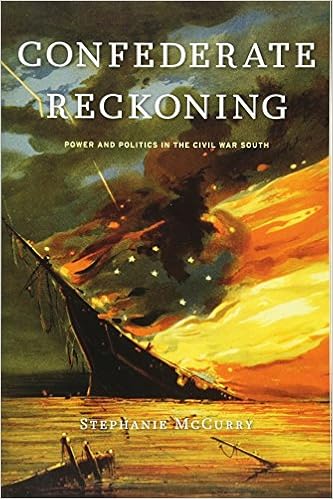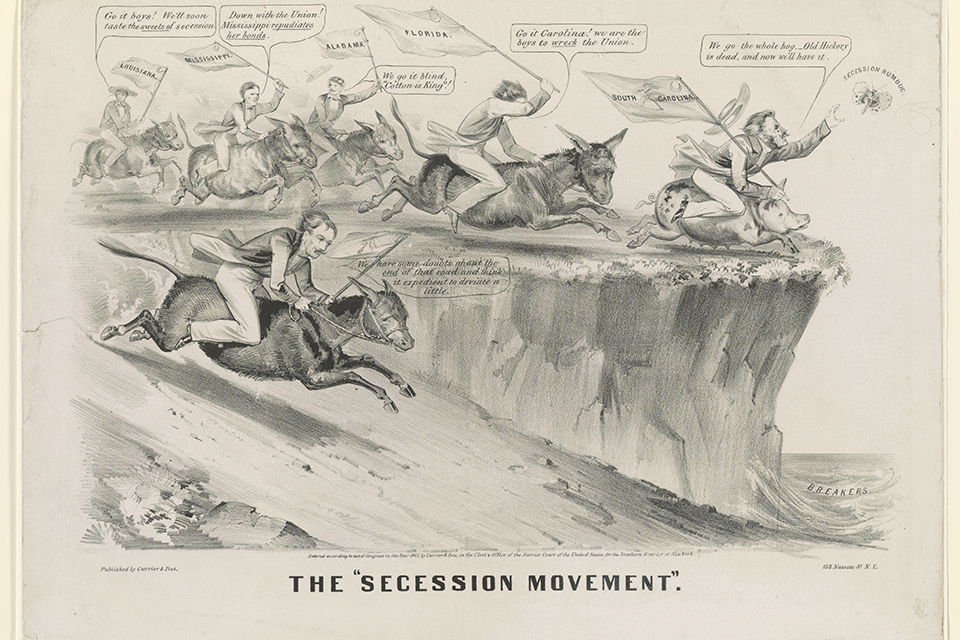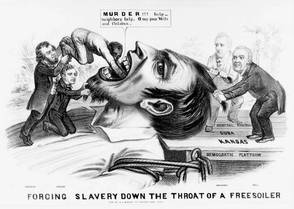
Plus ça change… As we view allegations of massive voter fraud during the election of 2020 — along with the reigning Democrats' haughty and disdainful attitude in the wake of Joe Biden's dubious "victory" — it leaves a bitter taste in the mouth to go back in time and read about the disturbing truth concerning the South's secession conventions of 1860-1861.
These used to be presented by historians and history teachers as straight-forward as well as a reflection of the Southern people's true desires; but they turn out to present the same lack of scruples as the presidential election 160 years later. (Remember that an American election is not one single election for the White House, but 51 elections for the presidency… Oh, and by the way, regarding this post's title, if you protest that there were 11 states that formed the Confederacy, I am speaking only of the slave states — seven, slightly less than half the total number — which had seceded prior to the war's outbreak at Fort Sumter.)
But before we delve into details of the "the great secession winter," we need to establish some parameters. (If you want to skip directly to the meat, it is below the cover image of Stephanie McCurry's audiobook below…)
Did you know that in the 1850s, members of the Democrat party were referred to regularly as fire eaters or as locofocos? Just as one of this blog's most prominent posts over the past 17 years explained how we are (now) living in The Era of the Drama Queens.
As talk over the past two or three years has warned of a second civil war, doesn't it sound like the Democrats have not changed an iota since the 1850s and perhaps even since the party's foundation by Andrew Jackson?
That, after all, was the thesis of Dinesh D'Souza's book and film on The Secret History of the Democratic Party (in which King Andrew the First plays a prominent role).
Moreover, as I have written before, prior to his becoming the Republican Party's 1860 candidate, Abraham Lincoln held a speech in February 1860 (indeed, his Cooper Union speech galvanized the Republicans to eventually choose him as their candidate) in which he told his audience how he would address himself to them as if they were composed of Southerners and Democrats:
… when you speak of us Republicans, you do so only to denounce us as reptiles, or, at the best, as no better than outlaws. You will grant a hearing to pirates or murderers, but nothing like it to [Republicans]. In all your contentions with one another, each of you deems an unconditional condemnation of [Republicanism] as the first thing to be attended to. Indeed, such condemnation of us seems to be an indispensable prerequisite — license, so to speak — among you to be admitted or permitted to speak at all. Now, can you, or not, be prevailed upon to pause and to consider whether this is quite just to us, or even to yourselves? Bring forward your charges and specifications, and then be patient long enough to hear us deny or justify.How many democrats amd MSM outlets in this day and age are willing to be "patient … to hear [Republicans] deny or justify"? Don't CNN, MSNBC, and the New York Times deem "an unconditional condemnation of [Republicanism or Trumpism] as the first thing to be attended to"? "Reptiles, outlaws, pirates, murderers"… How often have Republicans been called (domestic) terrorists in the past years? (And in the years, in the decades, before that?).
Doesn't Lincoln's Cooper Union
speech sound like something a Donald Trump or a George Bush could legitimately say (obviously, in different words) in the 21st century?
Locofocos. Fire eaters. Drama Queens.
As their name implies, the leftists' raison d'être is to constantly search for melodrama, to find offense in everything, and to lie, or at least to exaggerate, to the very limits of reason (the first example in more recent times that comes to mind being Ed Driscoll's observation that every Republican candidate since the 1940s has been likened to none other than Adolf Hitler).
(This led to another of my posts on — present-day — leftists: The Leftist Worldview in a Nutshell: A world of Deserving Dreamers Vs. Despicable Deplorables.)
The hysterics of such locofocos is what leads to the Democrats' creation of the Ku Klux Klan, Antifa, and Black Lives Matter, along with opening fire on Fort Sumter. And by the way, before you mention racism, don't forget: the Southern slave states of the 19th century were all solidly Democrat, just as later, the (same) Jim Crow states of the 20th century were all solidly Democrat.
In that perspective, another lie, as we have seen, is that, contrary to modern leftists' contention that the two parties have switched since the Civil War era, such people as Dinesh D'Souza and Prager University's Carol Swain have demonstrated that during the so-called Big Switch, only one single solitary Dixiecrat in fact joined the Republicans while in the very first election after the Nixon/Ford administrations, and their alleged winning "Southern Strategy," the South was swept by the Democratic nominee, Jimmy Carter.
Again, as I have written before, we have all heard that the debate about what caused secession and ergo the Civil War: Was It Slavery and/or States' Rights? Wasn't It Rather Something Else — the Election of a Ghastly Republican to the White House? The victory of such a despicable being made the Democrats' locofocos go bat-shit crazy and proceed to tear the country for the next four years apart… That wouldn't sound like the 2016 election now, would it?
This brings us to the meat of this post, which is the secession conventions of 1860-1861, which turn out to resemble the 2020 election more than anything else…

The Youtube video maker Have History Will Travel uses the book Confederate Reckoning (Power and Politics in the Civil War South) to answer the question How Popular Was Secession? (video embedded below)
After all, as points out in A New Birth of Freedom "over one hundred thousand Southern men joined the Union army in the Civil War."
Quoting Confederate Reckoning author Stephanie McCurry, the Civil War enthusiast explains that
"each state campaign was a struggle by politicians to win — or appear to win — the unanimous consent of the people"… However, as the [South's] public began to turn their backs on secessionists, and disagree with their policies, other means were used to combat treason [!] to secession.
… "In the end, secession in the American South was neither a popular Democratic movement nor the accomplishment of a small slave-holding political élite. It was instead a hybrid thing, evincing at once the character of an administrative coup and of an open-fisted Democratic brawl"South Carolina stands as the symbol of secession, since it had on more than one occasion attempted to leave the Union. In December 1860, its secession convention voted unanimously to secede, not one vote against. However, those numbers are misleading, as McCurry describes. After the Compromise of 1850, [the Palmetto State] had attempted secession, but had been voted down by the yeoman up-country population. In 1860, fire-eaters were now going to risk not gaining a full withdrawal from the Union.Anticipating the possible rise of the Republican Party to national prominence, and in the wake of John Brown's raid at Harper's Ferry, secessionists began to form paramilitary groups in districts all over South Carolina, in their words to defend against threats to the state. However, secessionists used the paramilitary groups to attack political opponents, by harassing, brutally beating, whipping, tar-and-feathering, running them out of town, and lynching them. This was all used to force Unionists against voting in the upcoming elections, particularly for the electing delegates to the secession convention.
South Carolina had subverted the democratic process in their state. More than half of the elections were uncontested, with only one person running for a position. Therefore, even the unanimous decisions in South Carolina was done under duress and did not reflect the opinions of the people.
Alright, got that? Because the secession-supporting Democrats (suffering from extreme )?) were so upset over the previous (special) election, they decided to use extralegal methods, not least violence (prefiguring the postbellum Ku Klux Klan) as well as an administrative coup d'état, in the following election. Don't you recognize this one? Ain't it 2016 and 2020 all over again? (All over again, except it takes place 160 years previously…)
Had Time Magazine existed in the 1860s, how would it have reacted to a shadow campaign to produce the “proper outcome of the election”? Plus, note that 1860's Democrats had no compunction about calling the fellow (state) citizens/voters who do not follow the their desires as operating from a mindset of "treason."
But you know about Fulton County in Georgia (the 2020 version), correct? (That is, you do if you read and watch beyond the mainstream media…) Wait until you hear about what happened in the Peach State in January 1861…
Similar things happened all over the South. Let's look at one more state. Georgia's secession debate was fraught with election fraud. The vote by citizens on secession was suppressed by the governor until after the delegates voted in the secession convention. The delegates had a few test votes, and the first one resulted in 166 for secession and 130 against. There was [therefore] a prominent group of delegates that supported cooperation. But the fire-eaters had the advantage. The debate raged between the delegates and many of the cooperationists caved under the pressure of secessionists in the final vote, which resulted in 208 for and 89 against.
Pro-secessionist delegates did not get the unanimous decision they hoped for. They knew if they formed their own country, that dissent would threaten their independence. After the convention confirmed leaving the Union, the governor released the election results, showing secession with an advantage of 54%.
However, the governor had cooked the numbers. Up until the 1970s, that number was used by historians. But new research and documents demonstrated that those against secession had gotten just over 50% of the vote, meaning that Georgia left the Union under false pretenses.
Again, political maneuvering done all across the South to gain a majority towards secession. It was not clear-cut. Many states displayed a loyalty to the Union. Stephanie McCurry uses these examples to support the argument that the South was not a cohesive unit…
It's the Georgia debacle all over again. (Except, of course, it is not "again"; since it happened 160 years prior.) Indeed, it sounds like Georgia (and perhaps a handful of other states?) might have become like a state-size West Berlin enclave inside the CSA had the rules been adhered to properly. (A couple of interesting questions: how would that have affected General Sherman's march to the sea and his desire to "make Georgia howl"? Since there was no reason to make the Peach State howl, the march probably would never have happened… At the risk of having a Union enclave inside their midst — which Union troops (under perhaps a Georgian general?) could use to march West (or North, towards and through the Carolinas and Virginia) — wouldn't Confederate armies have tried to invade and occupy their (non-)sister state?) In real life, interestingly, Georgia would be the final of the 11 secessionist states to be re-admitted to the Union, five years after Appomattox.
An enclave is something that, FYI, almost happened to Washington, DC, had Maryland joined the secessionists. Interestingly, Lincoln gets a lot of flack for suspending habeas corpus and imprisoning Maryland delegates and newspaper publishers, but as we can see from Stephanie McCurry's book, Democrat shenanigans and stealthy machinations that were far worse (but that Honest Abe, as well as a significant number of contemporary Americans, must have known about) have been ignored, ignored for a century and a half…
We must all work to see that the truth about the 2020 elections in Georgia — and in other states — does not wait 110 years (2131?!) before becoming public…
One final note:
In the Amazon's customer reviews section, I am not sure to what extent the commenters realize how close the Democrat Party of the 1850s/1860s (Southerners ") is to the Democrat Party of the 21st century. One writes that
In Armies of Deliverance: A New History of the Civil War (Oxford, 2019, $34.95), Elizabeth R. Varon offers a new interpretation of Northern Civil War rhetoric. While the standard narrative emphasizes the Union’s turn to “hard war” against the Confederate populace and infrastructure, Varon, Langbourne M. Williams professor of American history at the University of Virginia, argues that Northerners saw the war as a crusade to deliver the “deluded Southern masses” from domination by a minority elite of slaveholders indifferent to their needs. The rhetoric of deliverance, central to African-Americans’ campaign for freedom and civil rights, extended the benefits of emancipation to whites who would enjoy new opportunities for education, prosperity, and a voice in political affairs if the slaveholding elite were removed from power.
As you read Elizabeth R. Varon's answers to questions from NANCY TAPPAN, think about how both Republicans and Democrats have been framing the "narrative" in the past dozen years.
Many Northerners imagined the Civil War as a battle waged to deliver the South from the clutches of the “Slave Power,” a conspiracy of elite slaveholders who held disproportionate sway over national politics and who had duped, bullied, and even terrorized non-slaveholding white Southerners into supporting the project of secession. Deliverance was an expression of an idealistic view of the Union, popular among Northerners at this time, that saw America as bound together by consent and affection, not force and coercion. Northerners felt that in order to win the war they had to do more than compel Confederates’ submission. They had to win Southerners over and restore their love of the Union.
Who was the audience for deliverance rhetoric and how was it promoted? This “deluded masses” narrative was ubiquitous in the North. It was publicized in major periodicals such as Harper’s Weekly and Frank Leslie’s Illustrated Newspaper. It was in newspapers such as the moderate Republican New York Times and the Democratic New York Herald. You saw it in sermons and iconic speeches by Edward Everett and Abraham Lincoln. I was struck by how often the notion that the war’s purpose was to save Southerners from secession appeared in soldiers’ letters and diaries. Such rhetoric often cast Southern whites as errant brethren and prodigal sons who should return to the national family.
- How did Southerners react to deliverance rhetoric? From the very start, Southerners argued that Yankees were waging a ruthless, remorseless war of conquest and extermination. Southerners did this in part to discredit any Northern attempts to argue that Unionists were fighting in the best interests of the Southern people.
- … Wasn’t emancipation intended as a punishment for Southern whites?
- In the standard narrative, Lincoln’s emancipation policy was driven by the decision to take off the kid gloves and take away Confederate assets, namely slaves. I’m making a different argument. To a surprising degree, Lincoln and his allies justify emancipation as something that will redeem the South, not just punish it. A great deal of Northern rhetoric is devoted to making the case that emancipation will benefit white Southerners by encouraging economic development, education, and democracy.
Related: • What Caused Secession and Ergo the Civil War? Was It
Slavery and/or States' Rights? Or Wasn't It Rather Something
Else — the Election of a Ghastly Republican to the White House?
• Wondering Why Slavery Persisted for Almost 75 Years After the Founding of the USA? According to Lincoln, the Democrat Party's "Principled" Opposition to "Hate Speech"
• Why Does Nobody Ever Fret About Scandinavia's — Dreadful — 19th-C Slavery Conditions?
• The Confederate Flag: Another Brick in the Leftwing Activists' (Self-Serving) Demonization of America and Rewriting of History
• How to Prevent America from Becoming a Totalitarian State
• Inside of a month, Democrats have redefined riots and election challenges from the highest form of patriotism to an attack on democracy — And by “democracy”, they mean the Democrat Party
• The 1619 Project Summarized in One Single Sentence





